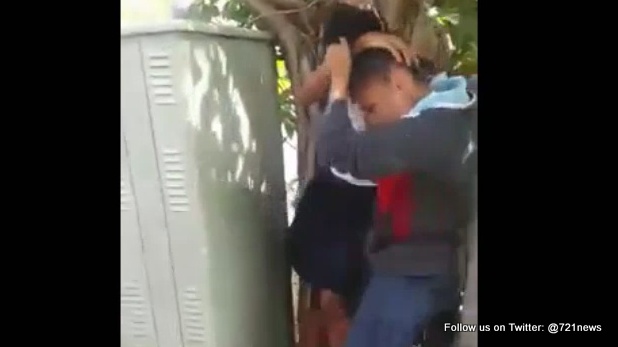By the TODAY Newspaper
“This defendant crossed the limits of decency”
 GREAT BAY – In the end, the tears came from 18-year old Jameirys Vanessa Rombley, the teenager who got into a brutal fight at the Milton Peters College with a 14-year old fellow-student on March 23. The Court in First Instance had just sentenced her to a 6-month conditional prison sentence and 180 hours of community service after she had timidly apologized to her victim who was present in the courtroom.
GREAT BAY – In the end, the tears came from 18-year old Jameirys Vanessa Rombley, the teenager who got into a brutal fight at the Milton Peters College with a 14-year old fellow-student on March 23. The Court in First Instance had just sentenced her to a 6-month conditional prison sentence and 180 hours of community service after she had timidly apologized to her victim who was present in the courtroom.
The prosecution locked up the teenager for five days after the fight before granting her conditional release. Attorney Cor Merx saw attempts to have the prosecution declared inadmissible go up in smoke. The Rehabilitation Bureau took some serious flak for writing what is according to Judge Maria Paulides “a worthless report.”
“She cracked her fingers at me and rolled her eyes,” Rombley told the court as an explanation for why she has attacked. “Then I exploded.”
The fight that followed was not pretty. Rombley hit the younger girl repeatedly in her face and when she fell to the ground, she bonked the girl’s head several times against the ground until she was unconscious. A video of the fight confirms this course of events.
The victim, a girl called Nicole, sustained bruises to her nose and just below her right eye. Rombley also pulled out some of her hair.
Prosecutor Karola van Nie doubted that the defendant had exploded. The video showed otherwise: when the confrontation began, she calmly tapped the other girl in her face, before she dealt the first blows.
The authorities granted Rombley conditional release because she was close to her final exams. She has in the meantime graduated and intends to pursue studies abroad to become an architect.
The report the Rehabilitation Bureau wrote about the defendant irritated Judge Paulides. “This is a worthless report. It says that the victim got what was coming to her. It is not proper for the Rehabilitation Bureau to conclude that the defendant has done this and under which circumstances. I draw my own conclusions.”
Prosecutor Van Nie charged the teenager with an attempt to cause grievous bodily harm. “A bloody nose, scratches, the loss of some hair and being briefly unconscious – legally that does not qualify as grievous bodily harm. That is why I charge this defendant with an attempt to do this.”
The prosecutor described the fight as vicious. “The defendant crossed all limits of decency. It was also dangerous. The fight only stopped because someone intervened.”
Van Nie said that the decision to prosecute the case was based on the wish to make a statement to the community. “This kind of behavior is improper. Whatever the reason for it was, violence is never the solution.”
That the girl was close to her final exams was an important consideration for the conditional release, the prosecutor said. “She did not have a reputation at school for being aggressive. This does not fit her character, so I am surprised about her attitude in court today.”
That attitude, whereby the defendant more or less suggested that the 14-year old had provoked the fight, could have cost her, but at the end of the trial Rombley got religion and told the court that she was truly sorry for what she had done. She also publicly apologized to Nicole.
Before that, Van Nie expressed her disappointment. “When I spoke with this defendant in pre-trial detention she told me a completely different story. I thought she had learned something and I expected that she could have told today that she is sure this will never happen again.”
The defendant’s attitude gave Van Nie reason to briefly reconsider the punishment-demand she had in mind but in the end, she let it go. The prosecutor also had her doubts about the report from the Rehab Bureau: “That was written by someone who is now on sick leave.”
In the end, the prosecutor demanded an 8-month conditional prison sentence and 160 hours of community service with 3 years of probation.
Attorney Cor Merx – who instructed his young client before the start of the trial to answer the judge’s questions where applicable with “Yes your honor” or “No your honor” – presented elaborate arguments to have the prosecution declared inadmissible.
“I wonder why school children are being summoned for an argument. That has not happened during the past fifteen years. In the Netherlands not even during the past 30 years.”
Merx said that fellow-attorneys had been surprised to hear that the case was being prosecuted.
He told the court that his client had been forced to follow anger management training at the Rehab Bureau. “That used to be a special condition imposed by the court. If such a course is a punishment the Court in First Instance can impose then undergoing such a training at the instigation of the prosecutor’s office is also a punishment.”
Referring to another case, Merx said that the prosecutor’s office had given his client the impression that it would not prosecute her if she was prepared to do the training. “That way the right to prosecute expires.”
Merx mentioned several other reasons why the prosecution should be declared inadmissible. One of them is the principle of ultimum remedium: prosecution only becomes an option after all other options (like suspension or expulsion from school) have failed.
Howev er, Judge Paulides rejected all these arguments.
Merx asked the court to declare his client guilty without imposing any punishment. “She has been punished enough already through her five days in a police cell, media publications and the fact that a criminal record will become a serious handicap for her future.”
The school refused to admit Rombley after the fight and refused to made books available to her, Merx added. The report from the Rehab Bureau shows that the girl experienced her five days in the police cell as traumatic.
Judge Paulides said that the prosecution had not raised expectations with the girl about not prosecuting. “Everything happened under the regular conditions linked to the suspension of her detention. The prosecutor’s office has the monopoly on prosecuting and its authority in this field is broad.”
The judge considered the charges proven and noted that the head is a vulnerable part of the human body. “You took out your frustrations on a young girl. You are a first offender and I consider the consequences this has had for you already, but I find the prosecutor’s demand as such fitting.”
The judge slightly tweaked the demand in her verdict: 6 months conditional imprisonment with 3 years of probation and 180 hours of community service (with a deduction of 10 hours for the five days Rombley spent in a police cell). If the girl does not do the community service she’ll have to go to jail for 90 days. The court also ordered her to pay her victim’s mother $30 and €114.34 for medical expenses.
RELATED ORIGINAL STORY >>>> Click Here






























